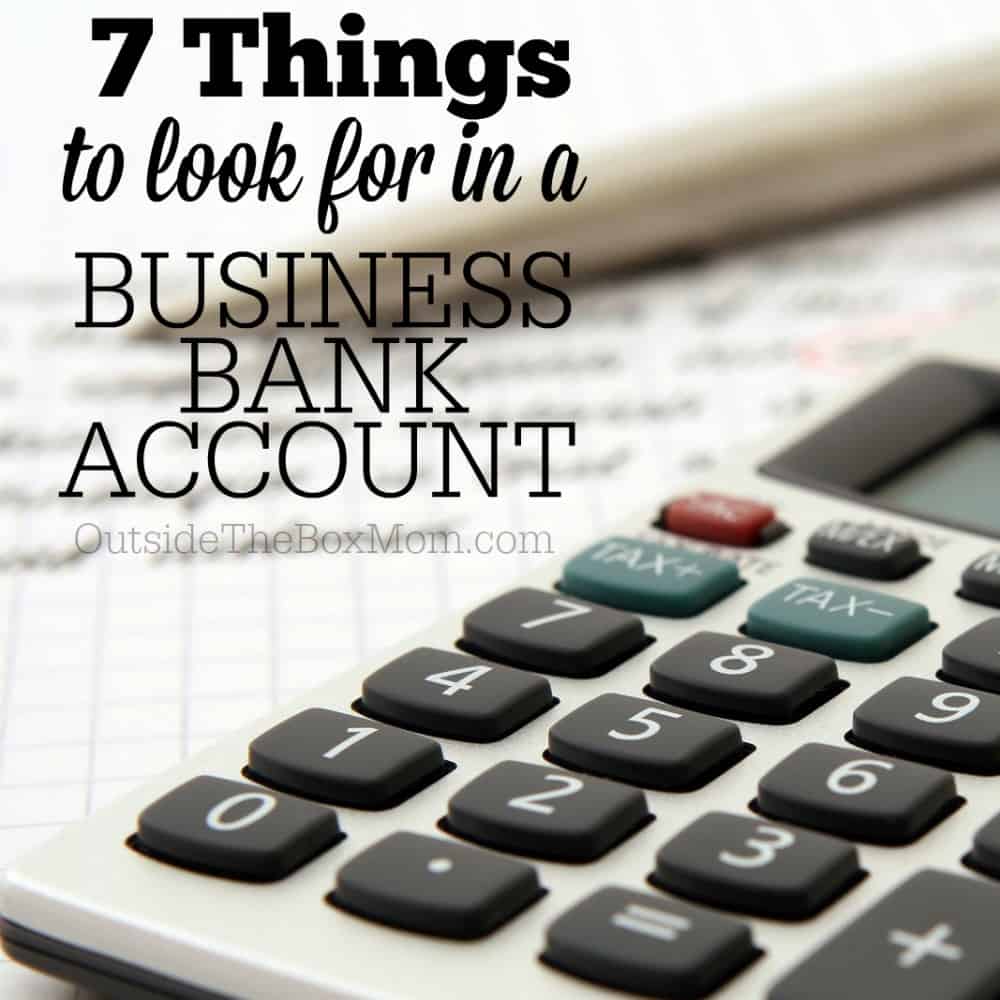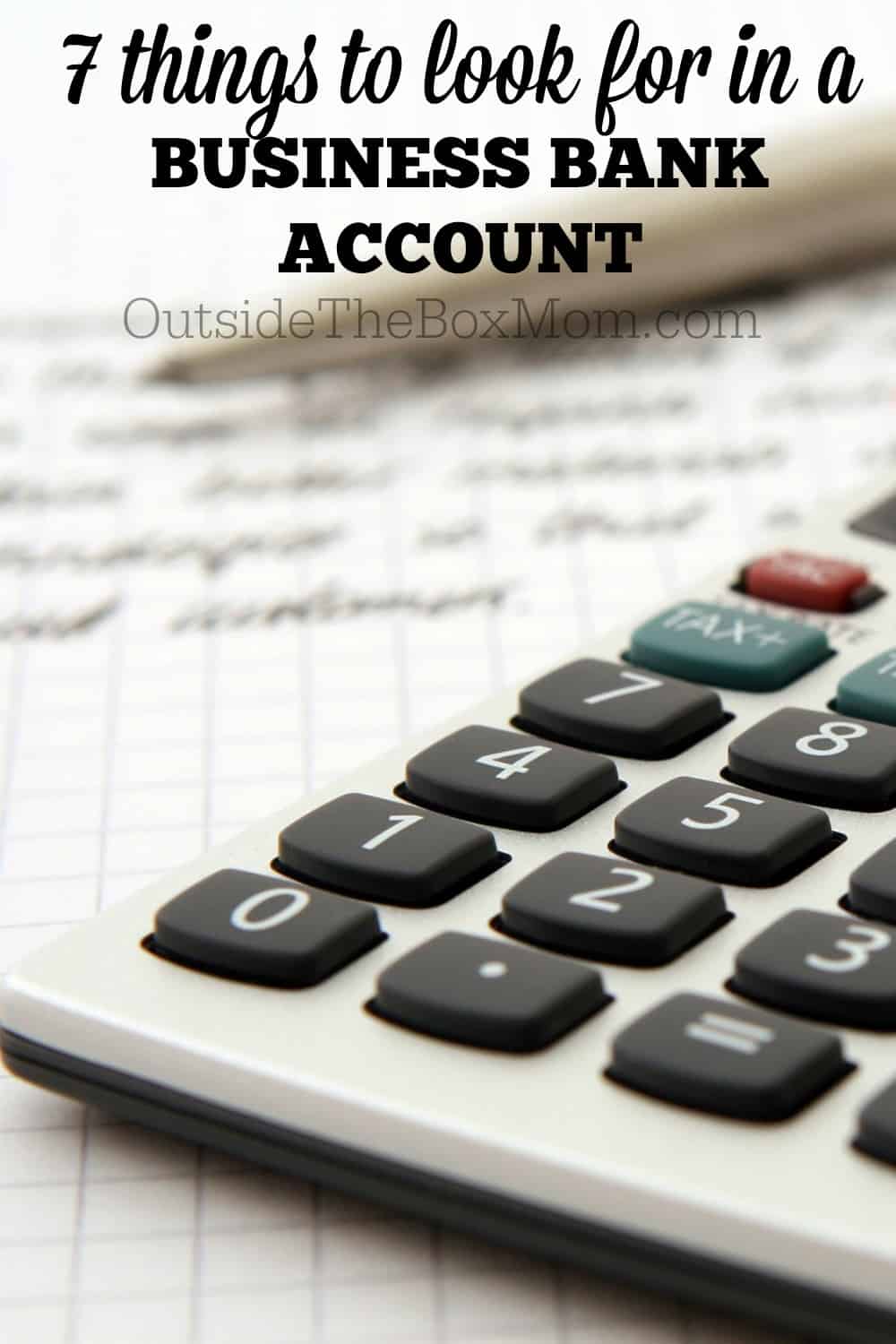If you have gone into business for yourself, you need to separate your business and personal finances. There are many options available for business bank accounts and this post will tell you about seven things you need to look for.

Whether you are an entrepreneur, sole proprietor or small business owner, having the proper business bank account is important and for that you must know how to open a business bank account.
This post is part of a series to help Entrepreneur Moms. Other posts include:
- 5 Sanity Saving Tips Every Mompreneur Needs
- 5 Smart Ways to Make Money on the Side
- These Home Office Ideas Will Make You Want to Work
- Five No-Cost Ways to Make Money Online
Every bank offers multiple types of accounts with varying features. One of the best ways to find a banking institution that suits your needs is to create a checklist of account feature must-haves.
1. Easy Online Access
Business bank accounts should be as easily accessed online as personal accounts. It is important to only access your business account from the office and your personal bank account from home or a personal mobile device. Keeping your personal and business accounts separate is a must. It may be possible to have those separate accounts with the same bank, which has its benefits.
Some banking institutions will log you into a personal account but will show others associated with your name, such as Chase Bank as an example. So, you would be able to check multiple accounts with a single login.
2. Access to a Financial Advisor
If you are planning on forming a new limited company, having access to a financial advisor that works with or for your financial institution, will allow you to have better guidance. The advisor will help you decide what type of banking account you need for your business type, how to plan for reinvestments into the business and how to plan business goals based upon available funds.
It is important to have experienced and educated business advisors who are knowledgeable about important business requirements and accounting standards, like ASC 842, including knowing the current ASC 842 deadline.
All of these things matter when selecting a bank account because it is where your business’ money is being kept safe and provides you a breakdown of how much money is available, tied up or in holding.
3. Limitless Business Checks without Fees
While this is typically something that banks do for personal banking accounts, some small business accounts also have unlimited check processing whether the company is writing or receiving them. This is important as many business owners neglect to remember that fees paid for banking services (such as check processing), can be deducted on business tax forms as a business-related expense.
Whether you have a florida business checking account or operate in a different state, it’s important to evaluate the checking account options. There are different account types and features, so ensure you are getting the best solution for your business.
4. Multiple Locations
When selecting a banking institution to do business with, having multiple locations nationwide, or even worldwide is ideal. You should be able to be anywhere in the world and have access to a local branch. It is not always possible to take care of banking matters from a different state or country.
In the business’ home base location, more than one banking branch should be available. If one is too busy, the other may not be. Busy businesspeople do not have time to stand in line at a bank for an hour waiting to be helped. This is also a situation where you would contact your personal banker for an immediate meeting.
5. A Personal Banker
A personal banker is someone that knows the details of your business’ needs, helps you separate personal and business accounts and also helps your business manage its money better. Whether you are a sole proprietor, business with employees or an entrepreneur, knowing how to manage your money is a must. A business needs a budget just as much as a family needs a budget. Every dollar spent should be spent on necessities, increasing efficiency and reinvesting into the business. A personal banker can help you and your business stay organized, notify you of issues with deposits or withdrawals and keep you informed of alternative programs that may aid your business’ finances.
6. Fast Funds Processing Times
Banking in today’s world is mostly digital. This means that it should no longer take more than 24-hours for a deposit or withdrawal to be processed. The faster your bank approves transactions, the better the financial records your business will be. If a major customer pays a large invoice, it should not take more than a business day – two at the most, to show as available.
7. No ATM Fees
Business accounts should not be subjected to ATM fees. Most businesses do not use ATM machines as it is, but some do require cash for specific vendors or executive petty cash expenses. If there are ATM fees associated with the account, ask about other options without the fees or keep track of ATM fees so you can deduct those fees on business tax returns at free efiling time.
Selecting the right bank account and banking institution is vital, not only for the company but for its employees as well. Employees expect instant access to their pay. Some banks may put holds on releasing funds, which causes employees to wait longer to access what they’ve already earned. Ensure that the bank account you select has every option that your business requires before opening it.
What do you look for in a business bank account?

Nowadays some UK banks use outsourcing for customer service and customer service departments can place in India, Philippins and so on which is very inconvenient for your business. My advice before open a company business bank account ask bank about such details.